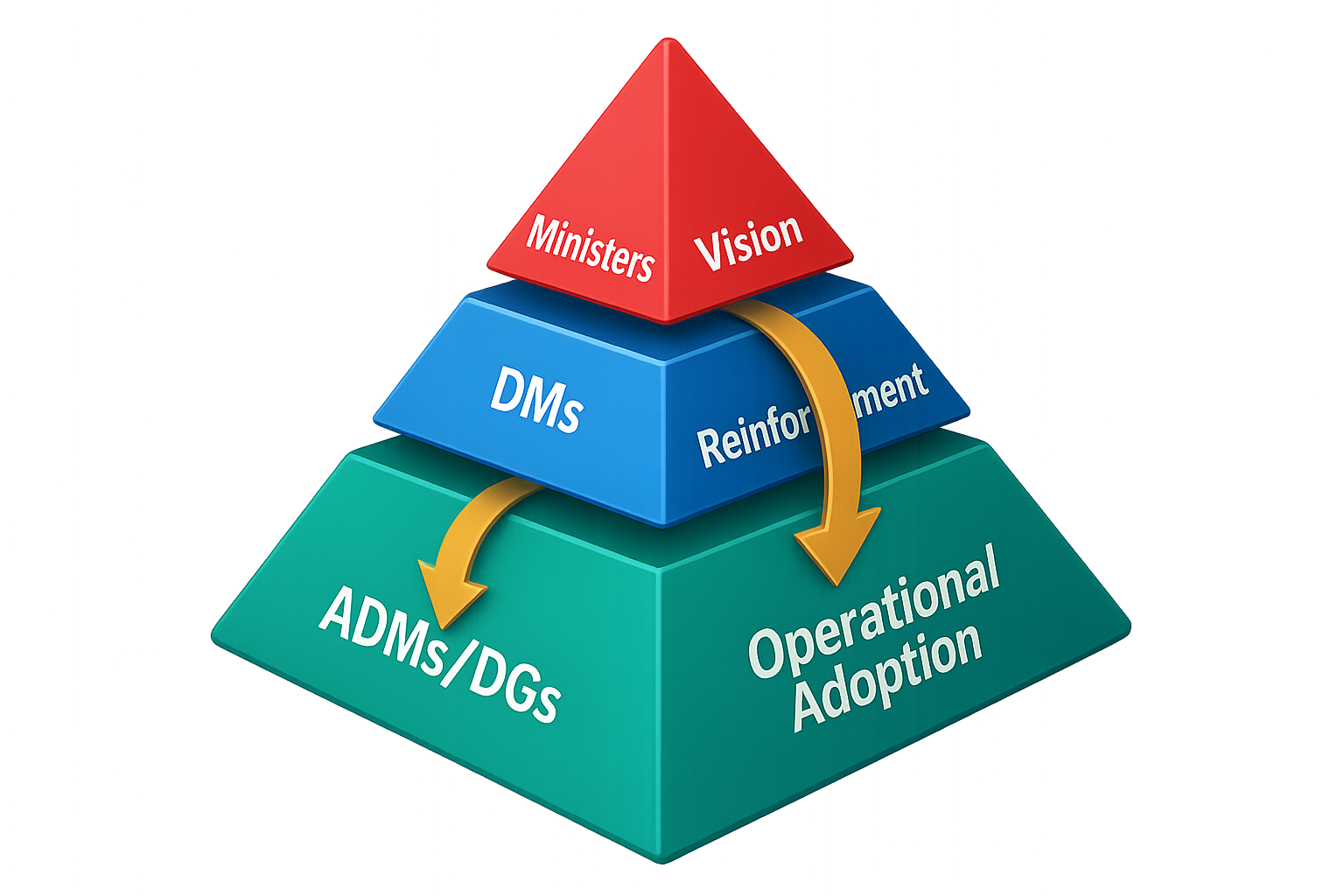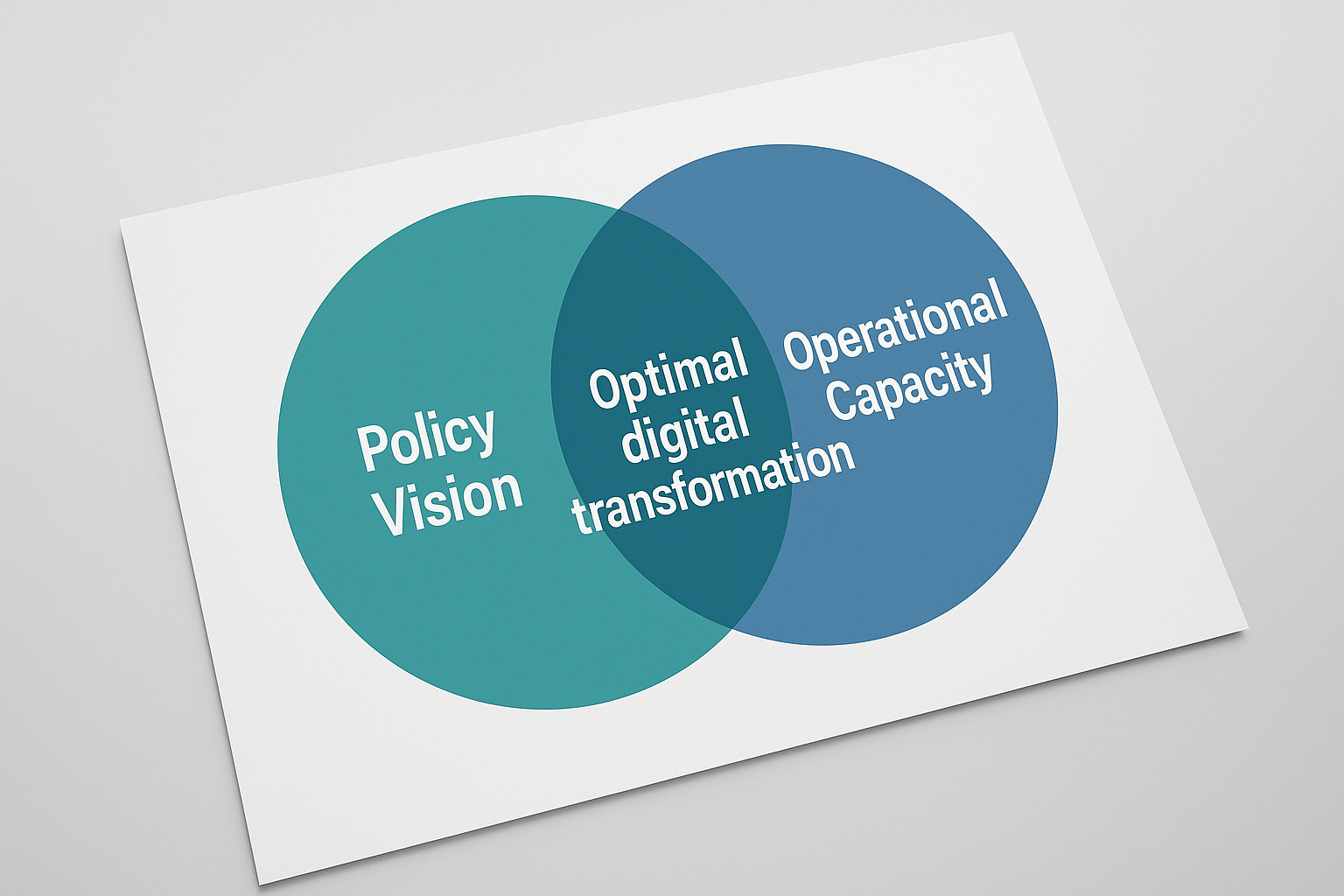Tag: Minister
-

Embedding Change: Ministers and DMs Driving Cultural Transformation in Government
Beyond Technology — Leading Cultural Change Digital transformation in government is not only a technological challenge but also a cultural one. Ministers and Deputy Ministers (DMs) are responsible for embedding new ways of working across departments, ensuring that staff adopt digital tools and processes while aligning with broader political priorities. Cultural transformation is critical because…
-

Driving Digital Transformation: Ministers and DMs as Strategic Anchors
Digital Transformation as a Leadership Imperative Digital transformation in government is not merely a technical upgrade; it is a strategic and cultural shift that affects every branch, process, and interaction with citizens. Ministers and Deputy Ministers (DMs) are responsible for anchoring this shift, ensuring that technology adoption aligns with political priorities, operational realities, and citizen…
-

Ministers and Deputy Ministers: Sustaining Transformation Amid Political and Operational Pressures
Leadership Continuity as a Transformation Imperative Ministers and Deputy Ministers (DMs) occupy the apex of government transformation efforts. Ministers provide political vision, drive mandate alignment, and engage stakeholders, while DMs ensure operational feasibility, continuity, and accountability. Transformation succeeds when political priorities and administrative capabilities are fully aligned, creating both momentum and sustainability. In a context…
-

Ministers and Deputy Ministers: Anchoring Transformation Through Political and Administrative Alignment
Political-Administrative Leadership as a Transformation Anchor In the Canadian federal system, transformation initiatives succeed only when political and administrative leadership align. Ministers set the political vision and policy direction, while Deputy Ministers (DMs) ensure administrative continuity and operational feasibility. When both roles work in synergy, reforms are not only launched but also embedded and sustained.…
-

Ministers and Deputy Ministers: Driving Transformation Through Unified Leadership
The Minister–DM Dyad in Transformation In Canada’s Westminster system, the partnership between Ministers and Deputy Ministers (DMs) is both delicate and central to effective government. Ministers hold democratic authority and set the political agenda, while DMs are professional public servants charged with translating that agenda into administrative reality. In transformational initiatives—whether digital modernization, policy reform,…
-

Ministers and Deputies as Transformation Sponsors: Driving Change While Guarding Stability
Sponsorship as Leadership In government transformation, the sponsorship role of Ministers and Deputy Ministers (DMs) cannot be overstated. Their commitment—or lack of it—determines whether reforms flourish or falter. As senior sponsors, they are the visible champions of change, shaping political legitimacy, allocating resources, and signaling organizational priorities (Kotter, 2012). Yet this role is paradoxical. Ministers…
-

Balancing Urgency and Patience: The Minister/Deputy’s Leadership Paradox in Transformation
Governing in Urgent Times In today’s political environment, urgency is a constant. Ministers face relentless demands from citizens, media, and stakeholders for quick results. Deputies, as the professional stewards of the public service, must translate this urgency into sustainable organizational action. Yet transformation, by its nature, requires patience. Major reforms in digital service delivery, regulatory…
-

Ministerial Leadership: Setting the Tone for Transformation Through Clear Accountability
Ministers as Strategic Anchors In Canada’s system of responsible government, Ministers stand at the political–administrative interface. As elected officials, they are both accountable to Parliament and responsible for providing direction to the public service. While Deputy Ministers oversee departmental operations, it is the Minister’s leadership that sets the tone for transformation, particularly in times of…
-

Yes, Minister (au Canada!)
I prepared this op-ed as both a match assessment (betting line?) for observers and as a perspective specifically for the players involved in this intended, one-in-a-lifetime transformation of the federal government. Parliament sits with a new cabinet and lofty ambitions to get things done. It is, once again, a time of hope. Let’s temper those…
-

Driving Transformation: Ministers and Deputies as Architects of Organizational Agility
The Imperative for Agility In today’s rapidly evolving policy environment, Ministers and Deputy Ministers are expected not only to set priorities but to foster agility across the public service. Policy challenges—from climate change to digital transformation to tariffs—require the federal public service to adapt quickly without sacrificing accountability. Yet the culture of government is inherently…
